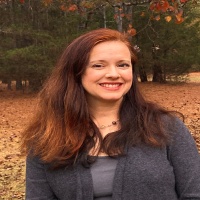Featured Lesson Designer
Increasing Your Teen’s Analytical Skills Using Science Fiction: An Interview with Cherie Stamile
Sci-fi can be an opportunity for students to have fun and exercise discernment at the same time.
Science fiction. Some parents steer clear of that reading genre due to questionable content, or perhaps they feel it’s irrelevant for a high school literature course. But according to Cherie Stamile, lesson designer for Analyzing Science Fiction Literature from a Christian Perspective, available at SchoolhouseTeachers.com, sci-fi can be an opportunity for students to have fun and exercise discernment at the same time. Cherie shares some of her insights from a recent interview below.
TOS: What inspired you to create this course?
Cherie: This course started out as a labor of love for my oldest daughter. After three years of rigorous honors level study of classics at the high school level, she needed something different that would help her connect to the twenty-first century. She also needed time to further develop her composition skills. Honestly, she also needed something fun. I did not want my daughter to grow up only knowing the literature of the past; it mattered that she also be introduced to more contemporary books. As a Christian, I wanted her to learn to apply the idea of “acknowledge the Lord in all your ways” to reading. I wanted my daughter to learn to be a thinking reader, able to identify and avoid deception. So, I made the decision to put together a homegrown course. My goal with this course was to give my daughter a survey of some of the well-known science fiction books from the past. So, I developed a chronological list of titles that became the spine of the course.
TOS: In your opinion, why is analyzing literature from a Christian perspective important for homeschoolers?
Cherie: The sci-fi books required as reading in this course connect the students to our modern day culture. The course is a chronological survey of some of the well-known sci-fi titles. The literature provides context for great discussions of not only literary elements but also Christian values and everyday application of these beliefs. So many of the themes and ideas from the dystopian and futuristic settings have crossovers to high school academic content in government, economics, psychology, and the sciences. Besides all the academic reasons to read these books, they also give the student common ground with people of all walks of life who love science fiction.
TOS: Do you have any advice for parents about teaching this course?
Cherie: Parents, if you are able to read the books or listen with audio to familiarize yourself with the content, your discussions can go much deeper than if you are just assigning the books. Also, make sure you read the parent letter in the beginning of the course. It explains needful details. As you get organized to facilitate the course, make sure you understand how the final project works. It is a collection of quotes gathered as the student reads the books. This is important for the course, but it is also so much fun. To allow your student to skip this project would be like missing out on the dessert!
TOS: Can you share a bit about your homeschool journey?
Cherie: My homeschool journey started before I even had children of my own back during college and the early young adult years as an art teacher. Besides teaching art in a school, I also taught art lessons to homeschooled families. Obviously, there is a wide spectrum of styles. But interacting with them made me realize that these children were growing up with good character and great academics. I had been one of those people who had internally said that I would never homeschool. That was before I knew anyone who lived that life personally. It was one of my high school small group art students who really influenced my outlook on homeschooling. He was from a family who homeschooled with excellence. The memory of his mature attitude stuck with me. I am thankful to use my teaching skills to create individualized educational plans tailored to the needs of each of my daughters. I am thankful that three sisters who are spread out in age have close relationships due to the fact that they had time to be together.
“The literature provides context for great discussions of not only literary elements but also Christian values and everyday application of these beliefs.”
TOS: Thank you, Cherie, for sharing with us about your course!
Parents, be sure to check out SchoolhouseTeachers.com to see if Cherie’s course is a good fit for your teen!
If you’d like more information about designing lessons for our site, please email the Executive Manager at stmanager@theoldschoolhouse.com.




 © 2001- 2024 SchoolhouseTeachers.com All Rights Reserved.
© 2001- 2024 SchoolhouseTeachers.com All Rights Reserved.